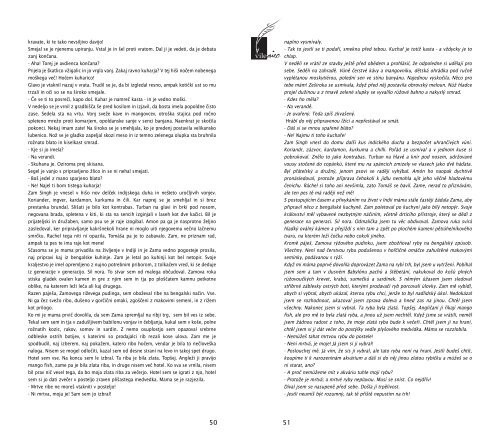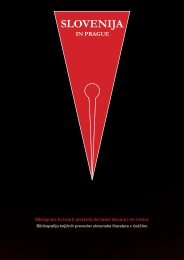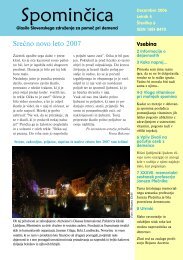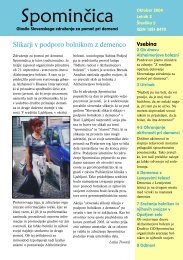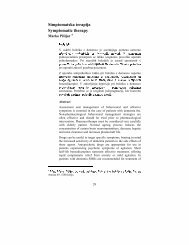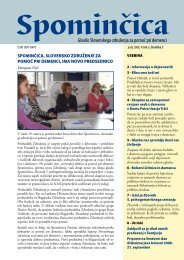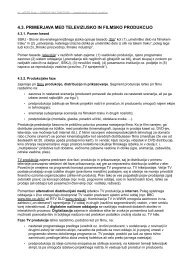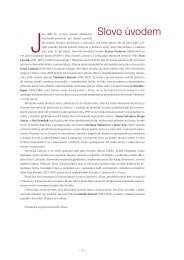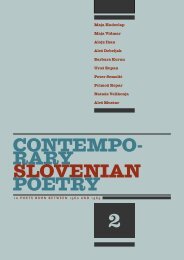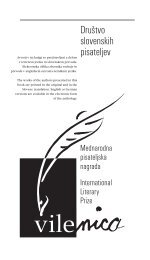Zbornik Mednarodnega literarnega srečanja Vilenica 2003 - Ljudmila
Zbornik Mednarodnega literarnega srečanja Vilenica 2003 - Ljudmila
Zbornik Mednarodnega literarnega srečanja Vilenica 2003 - Ljudmila
Create successful ePaper yourself
Turn your PDF publications into a flip-book with our unique Google optimized e-Paper software.
line. If he had decided to break off with me, he could have found a better reason for<br />
it. If he was acting, surely he would not keep me in suspense for long. But this time it<br />
was serious. D. said we should meet in the coffee bar of the Park Hotel the following<br />
day, at a time when no one would expect us, and have our first exchange of<br />
information then.<br />
"We have to be careful. We're being followed. Now to work, I have to get ready", he said<br />
rising from the table, and he departed.<br />
All I could do was get ready myself and show up for our meeting. I augmented my<br />
paltry knowledge of intelligence services with equally paltry facts from the General<br />
Encyclopedia. I arrived at the appointed time and found him sitting at a table, looking<br />
demented, red in the face, nostrils flaring.<br />
"What's the matter?"<br />
"Look at him over there", he said. "That pig is shadowing me. I'm so mad I can't think<br />
straight. And you, you're dangerous, you could pull a fast one on me."<br />
Sitting at a table was a smallish man, about thirty maybe, with a swarthy complexion<br />
and thick, curly hair. He was sipping a lemonade and watching us. Suddenly D. angrily<br />
rose from his chair and marched over to the man's table. He asked him on whose<br />
orders was he following him, when had he been assigned to the case and what were<br />
they waiting for, why didn't they liquidate him? The man looked at him in<br />
astonishment, not understanding a thing. He was a guest at the hotel, a Greek. D.<br />
briefly calmed down, later saying that Greece was strategically important to them,<br />
especially since it was an Orthodox country.<br />
The next day we met at Kalemegdan park. It was getting dark already. D. took a small<br />
transistor out of his bag and put on some music. He looked around and even walked<br />
a twenty-meter radius around the park bench. We had just sat down, huddled together<br />
to exchange our information when, as chance would have it, and chance always favours<br />
the narrator, a policeman stepped out of the bushes and asked for our I.D.s. D. was<br />
shocked and shook his head.<br />
'To choose a public park of all places!", said the policeman. "Beat it!"<br />
We headed down the slope to the train tracks. D. suggested that we get on the tram to<br />
cover our trail.<br />
'or a moment there I was in a cold sweat", he said. "I've got two letters to Brezhnev in<br />
my bag. But there's also a gun inside. If that ass had told me to open my bag, I would<br />
have killed him!"<br />
We got onto a half-empty tram. D. told me to sit behind him. or him, natural everyday<br />
occurrences were traps. There was no such thing as happenstance, or the unexpected.<br />
In nature, everything was connected. or him the world was coded, but he had the gift<br />
of being able to decipher the signs, and hence was always tense and mistrustful. Riding<br />
the tram I wondered: am I getting caught up in a dangerous game with a lunatic? When<br />
the tram stopped at the aculty of Economics, he suddenly got up, signalling me to<br />
follow. We jumped off the train and hurried towards the steps that lead up Kamenita<br />
Street to the Zeleni Venac Market. He said we had to split up; we could give them the<br />
slip under cover of darkness. And then suddenly he disappeared, I never even noticed<br />
how. or two weeks he was nowhere to be seen; to be honest, I did not try very hard<br />
to find him. I reproached myself for abetting a sick man.<br />
One morning I saw him in front of my building. He was pacing back and forth<br />
nervously, chain-smoking. I went down and invited him in, but he refused, saying that<br />
my flat was bugged just like his and suggesting that we meet at the Russian cemetery.<br />
He explained how to find it and which path would take me to the grave of Boris<br />
Aleksandrovich Chistogradov, where there was an open book in marble with the name<br />
26<br />
Ana Smirovna Vassilyevna inscribed on it.<br />
"Wait for me there", he said.<br />
He seemed to have gathered flesh in the fifteen days that I had not seen him. He had<br />
huge circles under his eyes and his face was puffy. When we met at the cemetery I told<br />
him that he had changed, that he looked pale and tired. He waved my comments away<br />
as irrelevant.<br />
"My health doesn't matter', he said. "I couldn't care less about life. What I want us to<br />
do here is to discuss global strategies. You know that the Soviet Union watches<br />
Yugoslavia with one eye, and winks at what it is doing with the other. or us Yugoslavia<br />
is a prisoner whom we allow freedom of movement. We monitor only the areas your<br />
service supports. All your generous handouts go into pockets we have already ripped<br />
open. What we want is to block the other side, not to change the situation in the<br />
country. Neither of us cares how this system works, just which of our two sides wins<br />
or loses. You want some kind of federalist revolution here, and we want an October<br />
revolution. Now tell me the methods you use to neutralise our influence and kill our<br />
chances?", he asked, his eyes fixed on me as he stood glumly at the grave of one Boris<br />
Aleksandrovich Christogradov. "I know you think I'm crazy", he went on, "and you're<br />
not the only one. If it makes you feel any better, I can be that too. But the fact is that<br />
I know too much and that it cannot be erased from my memory."<br />
"l'm sure you do", I said. "I just don't know why you picked me for the other side."<br />
He smiled as warily as a fox, training his eyes on me like an interrogator waiting for<br />
the suspect to change his statement.<br />
"Apart from being close to Mrs. Trevisan, a British subject from a bourgeois family,<br />
with a Serb father and a Croatian mother, you also see a CIA agent", he said.<br />
"And who's that'?", I asked.<br />
He ripped open the seam of his jacket lining and took out a tiny notebook; this was<br />
where he kept a coded record of my meetings with foreign correspondents. He had<br />
something to say about each and every one of them; all of them were in the employ of<br />
one intelligence service or another. He pronounced Dan Morgan, the Washington Post<br />
correspondent, a double agent. Even ranco Petrone, Unita's Belgrade correspondent,<br />
was not spared. As far as D. was concerned, West European communist parties had<br />
sold out to the ruling bourgeoisie anyway.<br />
"If you refuse to see me and collaborate with me, then all I can do is put a bullet<br />
through my head", he said.<br />
This man of keen observation and bold gesture, this great admirer of literature,<br />
raconteur and conversationalist, was now weighed down by international worries as<br />
well. Was it that or something else which had aged him so quickly that you could see<br />
him deteriorate by the day? All I could do was persist in the role of a sick man's<br />
accomplice.<br />
"Now then", he said, "tell me briefly about your strategy."<br />
"Our goal is destabilisation, it is not to destroy the system, at least not for now", I said.<br />
"We undermine the foundations of your influence by encouraging national communism<br />
and weakening the monolithic party. Loosen its hold, and you're half-way there. We stir<br />
things up, you put them back the way they were; it's an interesting game. We work<br />
systematically and with a view to the long term, financing the press to develop the kind<br />
of criticism that is bound to bear fruit one day. We have been saying for ages that Stalin<br />
was a murdering maniac and that communist mythology is turning a thick-skulled<br />
leader into a genius. Student newspapers have no compunction about calling Brezhnev<br />
a rhinoceros."<br />
"Yes. yes," he almost groaned. He kept chain-smoking. He wiped away the sweat, but<br />
27


